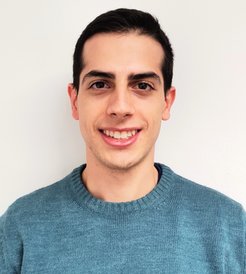Dr. Cecilio García Quirós joins the group
New postdoc broadens the expertise in “Binary Merger Observations and Numerical Relativity”
In October 2021, a third postdoc has joined the Independent Max Planck Research Group “Binary Merger Observations and Numerical Relativity”. Dr. Cecilio García Quirós will work on two core research topics of the group: waveform modelling strategies and data analysis techniques.

When and why did you decide that you wanted to study Physics? It was during my last years in high school when I decided that I wanted to study Physics. I am a very curious person and I have always asked a lot of questions, and Physics is the discipline that seems to provide most of my answers. I love how Physics can describe Nature and how we are able to understand such complex events some of which occur so far in distance and in time.
What were the first research projects you worked on? I studied Physics at the University of Granada in Spain, where I also obtained my Bachelor's and Master's degrees. I initially started my research career in something different from gravitational waves, when I worked on research in particle physics. I also got several scholar grants to study cosmic rays with the Pierre Auger Observatory and also to search for imprints of Dark Matter in data from the neutrino telescopes Antares and KM3NeT. This meant working on astrophysics and data analysis problems, too, but from a different perspective and with instruments quite different from LIGO and Virgo.
How did you get into gravitational-wave research? During my academic years I always preferred to study general relativity over particle physics and gravitational waves had not been directly detected yet by that time. Although my research career started in particle physics, I really wanted to contribute to the study of gravitational waves and to this exciting and emerging kind of astronomy, so I decided to dedicate my PhD to that. For my PhD in Physics I moved to the University of the Balearic Islands in 2016 where I worked under the supervision of Prof. Sascha Husa and Prof. Alicia Sintes. During my PhD studies I developed accurate and computationally efficient waveform models for the gravitational-wave signals emitted by binary black hole coalescences. In particular, these models calibrated the effects of subdominant harmonics to numerical relativity waveforms for aligned spins cases, while precession was added through a semi-analytical approximation. Moreover, I pionereed the description of mode-mixing in phenomenological waveform models, how to extend them to the regime of extreme-mass-ratio inspirals and how to include the Multibanding technique to significantly reduce the computational cost of these models. Both are key features for the signals that will be detected by the LISA mission.
Have your theoretical developments been used in the real world? Yes! In fact, both models are now preferred by the LIGO and Virgo Collaborations for the analysis of events from the second half of O3. I also performed multiple parameter estimation studies with these new models analyzing several events from O3 including the first neutron-star–black-hole merger detections.
With this professional background in mind, what will you work on at AEI Hannover? My main interests are in waveform modelling and data analysis techniques. I will focus on these by improving the current calibration of phenomenological models to numerical relativity waveforms, but also by trying to understand how black holes kicks can inform us about the shape fo the waveforms. And then I would also analyze how waveforms deficiencies affect to the systematic errors in our parameter estimation studies.
Is there something outside physics that you especially look forward to during your time in Germany? After these years of the pandemic, I really look forward to be able to meet new people and do more social activities. I think that Germany, and specially the AEI, is a very good place to meet people from around the world and from different cultural backgrounds. This, I believe, would be really enriching for me from a personal development perspective and I wish to develop lasting friendships during my stay here.












